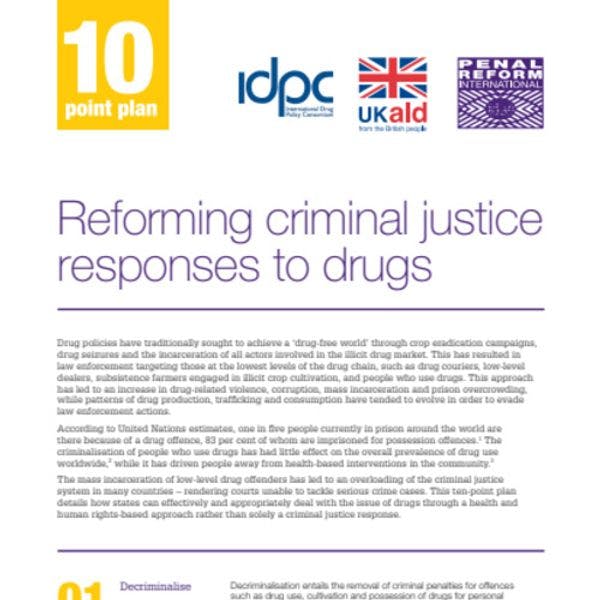Ten-point plan on reforming criminal justice responses to drugs
Drug policies have traditionally sought to achieve a ‘drug‑free world’ through crop eradication campaigns, drug seizures and the incarceration of all actors involved in the illicit drug market. This has resulted in law enforcement targeting those at the lowest levels of the drug chain, such as drug couriers, low‑level dealers, subsistence farmers engaged in illicit crop cultivation, and people who use drugs. This approach has led to an increase in drug‑related violence, corruption, mass incarceration and prison overcrowding, while patterns of drug production, trafficking and consumption have tended to evolve in order to evade law enforcement actions.
According to United Nations estimates, one in five people currently in prison around the world are there because of a drug offence, 83 per cent of whom are imprisoned for possession offences. The criminalisation of people who use drugs has had little effect on the overall prevalence of drug use worldwide, while it has driven people away from health‑based interventions in the community.
The mass incarceration of low‑level drug offenders has led to an overloading of the criminal justice system in many countries – rendering courts unable to tackle serious crime cases. This ten‑point plan details how states can effectively and appropriately deal with the issue of drugs through a health and human rights‑based approach rather than solely a criminal justice response.
Note: May 2020 Amendment
The publications below initially stated that, according to the UN Commission on Crime Prevention and Criminal Justice (CCPJ), 83% of all people convicted for a drug offence had been sentenced for drug possession. In May 2020, this was amended to reflect the accurate interpretation of the CCPJ’s findings, which is that 83% of all recorded drug offences are offences related to possession, with no reference to sentencing. According to more recent UN data from 2019, one in five people incarcerated worldwide are detained for a drug offence, of which 21.65% (or 470,000 people) were detained for drug use and drug possession only.
Keep up-to-date with drug policy developments by subscribing to the IDPC Monthly Alert.
